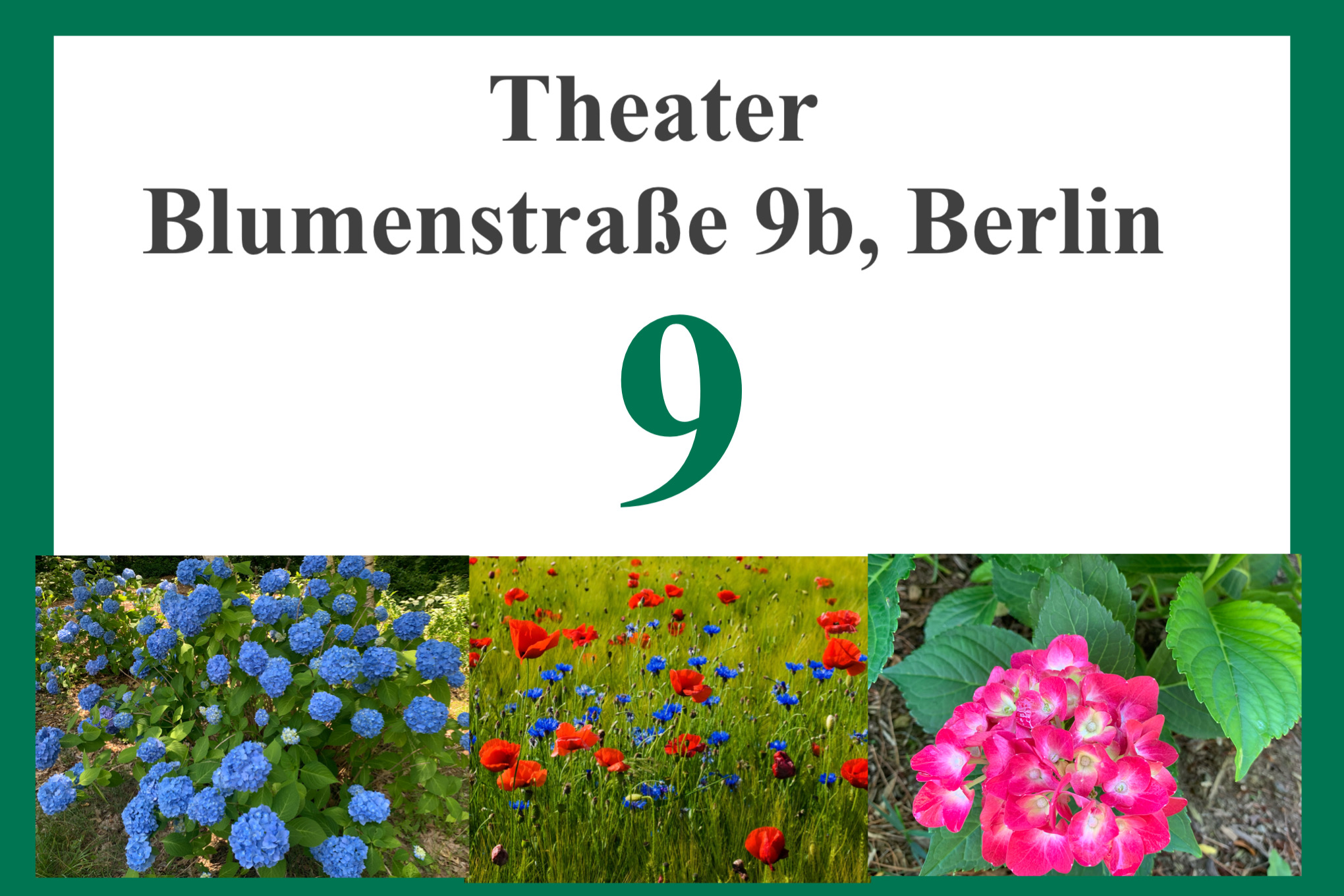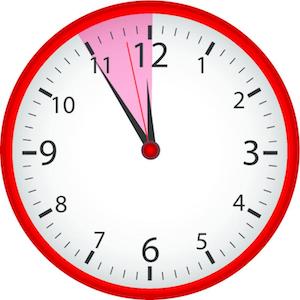German Numbers 0-13 Idioms: “Ach du grüne Neune” and others
 [Updated: 07-18-2022. One of our readers kindly suggested that we should add 13 to our 1-12 German Numbers Idioms: "Jetzt schlägt es 13 (dreizehn)! Diese Zahl habt ihr vergessen. Bitte möglichst noch dazufügen".
[Updated: 07-18-2022. One of our readers kindly suggested that we should add 13 to our 1-12 German Numbers Idioms: "Jetzt schlägt es 13 (dreizehn)! Diese Zahl habt ihr vergessen. Bitte möglichst noch dazufügen".
And, why not? Scroll down to find out what it means.]
Idioms are a wonderful, expressive part of any language. But because you cannot guess the meaning from the words in them, they can be puzzling. And, some idioms are regional.
From time to time, even native speakers come across idioms in their own language that they haven't heard before.
I spent my childhood years in Austria (and the Netherlands) before immigrating with my parents to Canada. In our family, we continued to speak German among ourselves. So when I returned to Austria and Germany as a teenager and young adult, I understood and used most of the idioms I've listed below.
But there was one exception:
When my father-in-law once exclaimed: “Ach du grüne Neune!” I had no idea what he meant. It only was clear that he was surprised at something. But why the number nine? And with an "e" added on: "Neune".
When I heard this expression again the other day, I consulted the Duden for more German idioms with numbers. The Duden is a German language dictionary published by the Bibliographisches Institut GmbH. It is updated regularly and can be searched online.
Below you'll find thirteen German Numbers Idioms:
0 - Null: Null Bock haben.
 Idiom: Not feeling like it
Idiom: Not feeling like it
Literally: To have zero buck. (Photo by Paxson Woelber on Unsplash)
Duden: Umgangssprachlich für Keine Lust zu, auf etwas haben. (Colloquial for having no inclination to do something or no desire for something.)
Origin: “Null Bock haben” became part of teen slang in the 1980's. A popular novel that came out in 1984 was called "Null Bock auf DDR", which described drop-out youth cultures in East Germany.
There's also some speculation that “Bock” (German for “buck” or “ram”) goes back to the Romani word “bokh”, meaning “hunger”. This would suggest that “null Bock haben” would mean "no hunger/desire for something".
1 - Eins: Jemandem eins auswischen.
Idiom: To pull a fast one on someone.
Literally: To give someone a swipe.
Duden: Umgangssprachlich für “jemanden schaden”. (Colloquial for "harming someone".)
Origin: The quick sweeping movement of a sword is likely the origin of this idiom. First used by fraternities to describe a quick attack in a duel, it gradually entered everyday language.
 2 - Zwei: Alles hat einmal ein Ende, nur die Wurst hat zwei.
2 - Zwei: Alles hat einmal ein Ende, nur die Wurst hat zwei.
Idiom: There's an end for everything.
Literally: Everything has an end, only the sausage has two. (Photo by Charles Deluviu on Unsplash)
Duden: Scherzhaft für "alles muss einmal aufhören". (A humorous way to say that "everything has to end sometime".)
Origin: The saying has shown up in various places, including in Walter Scott's novel "Woodstock or the Cavalier" (1826).
In 1987, the German pop singer Stephan Remmler of the music genre Neue Deutsche Welle composed and produced the song: "Alles hat ein Ende nur die Wurst hat zwei".
3 - Drei: Aller guten Dinge sind drei.
Idiom: Third time's the charm.
Literally: All good things are three.
Duden: Ausspruch zur Rechtfertigung von etwas, was jemand ein drittes Mal tut, oder zum dritten Mal probiert. (A way to justify doing or trying something for the third time.)
Origin: This saying probably goes back to the Middle Ages, when a council meeting took place three times a year. A defendant thus had three chances to face his judges. If he did not appear by the third time that the council met, he would be sentenced by default.
4 - Vier: Alle Viere von sich strecken.
Idiom: To unwind. (Photo by Ralph (Ravi) Kayden on Unsplash)
Literally: To stretch out all fours (i.e. your arms and legs).
Duden: Sich behaglich ausgestreckt ausruhen. (Flop down into a comfortable position and relax.)
Origin: This idiom is based on the number four, the two arms and two legs of a human being.
Fünf - 5: Du musst auch mal fünf gerade sein lassen.
Idiom: Don't be a stickler.
Literally: Sometimes you have to let five be an even number.
Duden: Umgangssprachlich für "etwas nicht so genau nehmen". (Colloquial expression for stretching a point here and there, not insisting on perfection.)
Origin: Five is an uneven number. So, letting five be "even", means that you accept that something is not perfect or correct.
6 - Sechs. Eine Sechs schreiben.
Idiom: To flunk.
Literally: To write a six.
Duden: Eine Arbeit schreiben, die mit der Note 6 bewertet wird. (Write a test or exam that gets an F grade.)
Origin: This phrase refers to the grading system in German schools, which uses a 6 or 5 point scale. In that system, a "6" means a failing grade.
 7 - Sieben: Mit Siebenmeilenstiefeln.
7 - Sieben: Mit Siebenmeilenstiefeln.
Idiom: At breakneck speed.
Literally: With seven-league boots. (Photo by Will Porada on Unsplash)
Duden: Mit sehr großen Schritten, sehr schnell voran gehen. (Getting ahead using very large steps, going very quickly.)
Origin: "Seven-league boots" appeared as "bottes de sept lieues" in the fairy tale "Le Petit Poucet" by the French poet and storyteller Charles Perrault.
The tale was published in 1697 as part of Histoires ou Contes du temps passé. The seven-league boots gave to the wearer the ability to travel far and at high speed, i.e. he could do seven leagues in a single stride.
8 - Acht: Eine Achterbahnfahrt.
Idiom: A roller coaster ride.
Literally: A figure-8 train ride.
Duden: Schwanken zwischen Extremen; Auf und Ab. (Fluctuating, wavering between two extremes; Having ups and downs).
Origin: "Eine Achterbahnfahrt" is a high-speed ride in an amusement park set on an elevated rail, which often has the shape of an eight. The ride takes you through tight curves and sudden ups and down.
In our times, you frequently hear people say that the stock market in Germany and elsewhere is "eine Achterbahnfahrt".
9 - Neun: Ach du grüne Neune!
Idiom: Good grief!
Literally: Oh, you green nine!
Duden: Umgangssprachlicher Ausruf der Verwunderung oder des Erschreckens; "Neune" eine Variante für "Neun". (A Colloquial expression of surprise or shock. "Neune" is a variation of "Neun", as in bowling when "all nine" pins fall - "alle Neune". )
Origin: Several stories around the origin of this expression exist. One tells of a theater on the Blumenstraße 9b in Berlin, which had its main entrance on the "Grünen Weg" (Green Road). The theater produced lively local plays. Behind the theater was a garden restaurant with chairs and tables said to have been painted green.
Another theory points to French fortune-telling cards where Pik Neun (English: Nine of Spade) is a green card and forebodes bad luck.
10 - Zehn: Da bringen mich keine zehn Pferde hin.
Idiom: Wild horses can't drag me there.
Literally: No ten horses will get me there. (Photo by Bethany Legg on Unsplash)
Duden: Umgangssprachlich für "unter keinen Umständen irgendwohin gehen, oder etwas tun". (Colloquial for "absolutely refusing to go somewhere or do something".)
Origin: One explanation for this idiom apparently goes back to the Middle Ages when ten horses were not enough compensation for taking a bride.
Another, more obvious one, is that horses are strong animals, but the person's dislike for doing something happens to be even stronger.
11 - Elf : Elfmeter schießen.
Idiom: Kick from the 11 meter penalty spot (in soccer).
Literally: Shooting eleven meters.
Duden: Nach bestimmten schweren Regelverstößen innerhalb des Strafraums verhängte Strafe, bei der der Ball vom Elfmeterpunkt aus direkt auf das Tor geschossen werden darf; Strafstoß.
(A punishment given to a player after specific serious foul-play offenses within the penalty area. The ball can then be kicked from the eleven meter point directly onto the goal; penalty shot.)
Origin: "Elfmeter" signals that the spot is 11 meters away from the goal line. The penalty area (16 meter from the goal posts) and the 11 meter penalty spot were introduced in 1902.
The first "penalty" shoot-out (to decide a tied game score) in the World Cup was on January 9th, 1977, when Tunisia beat Morocco.
 12 - Zwölf: Es ist fünf vor zwölf.
12 - Zwölf: Es ist fünf vor zwölf.
Idiom: It's high time.
Literally: It's five to twelve.
Duden: Es ist höchste Zeit einzugreifen, etwas zu stoppen. (It's high time we intervened or stopped something.)
Origin: One story about this idiom goes back to earlier times when a master builder and his crew were working on the scaffolding of a church tower.
At "five to twelve" they would be warned to come down quickly, because the loud ring of the church bells would endanger the hearing of whoever was close by.
The expression "es ist fünf vor zwölf" was frequently used by health care officials in Germany to warn about the rapid increase of Covid-19 infections. You also hear it as a warning of the impending climate change crisis.
13 - Dreizehn: Jetzt schlägts (aber) dreizehn.
Idiom: Enough is enough.
Literally: (But) now the clock is striking thirteen.
Duden: Das geht aber zu weit, jetzt ist Schluss damit. (That's going too far, time to stop it.)
Origin: According to popular belief, thirteen is an unlucky number. (Die dreizehn gilt im Volksglauben als Unglückszahl.)
When you think about it, most of these expressions are quite apropos for many moments in our lives right now. How often have I thought to myself: "Darauf habe ich null Bock" (I really don't feel like doing this).
Or: "Ich will nichts als alle Viere von mir strecken" (What I really want is get comfortable and relax). I especially like the idea of "Alles hat einmal ein Ende, nur die Wurst hat zwei".
More seriously for language learners: When you practice these idioms, you also get some insight into how spoken language is put together. And, you can wow your German friends, by dropping one or two of these idioms into a party conversation or in a Zoom chat.
